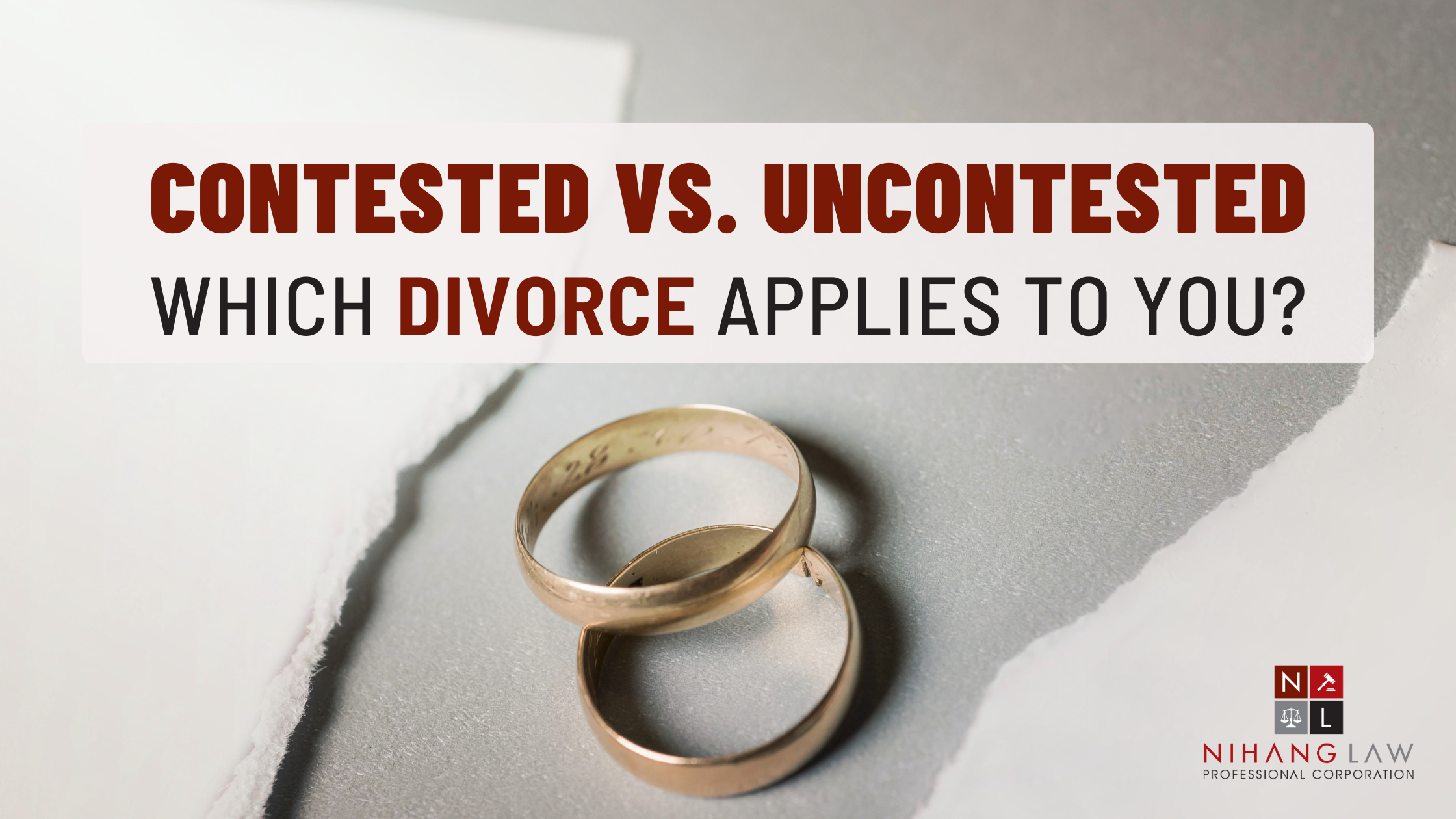
18th July 2025BY Nihang Law
Contested vs. Uncontested Divorce: Which One Applies to You?
Going through a divorce is an emotionally challenging rollercoaster to go through, especially after experiencing the sad ending of a relationship. Choosing to legally separate from your spouse can bring about a range of complex issues, from child custody and support to property division and financial arrangements. At Nihang Law, we understand how overwhelming this process can be, and we’re here to help you navigate every step with clarity and confidence.
In practice, divorces are often categorized as either uncontested or contested, depending on whether both parties agree on the key issues. Knowing which type applies to your situation is the first step toward a smoother legal process. Below is a guide to help you determine which category your divorce falls under and what steps come next to resolve your matter efficiently and effectively.
Uncontested Divorce in Ontario
An uncontested divorce occurs when both parties have a mutual agreement on all major issues, including the decision to divorce, child support and custody, spousal support, and the division of assets and property. Uncontested divorce includes joint divorce and simple divorce.
A joint divorce is when both spouses apply together to end the marriage and agree on all related issues. Meanwhile, a simple divorce is when one spouse files on their own, and the other does not contest the application.
An uncontested divorce is generally a straightforward and easier process compared to a contested divorce. Likewise, it is less expensive and brings about less emotional stress to the separating couple. Uncontested divorces typically proceed without the need for trial or formal litigation. While hiring a lawyer may be useful to sort out paperwork and clarify the details of the divorce, doing so isn’t necessary for an uncontested divorce.
Filing an Uncontested Divorce Online in Ontario
The separating couple will be required to file their divorce application online with the municipal court in their region. Along with this, they will need to provide their marriage certificate, as well as any court orders or domestic contracts between the spouses. If there are children or support issues, the parties must provide details on how custody, access, and support will be arranged. The court must be satisfied that the arrangements are in accordance with Ontario’s Child Support Guidelines before granting a divorce.
Once the court has reviewed and approved the application, it will issue a divorce order, which will be the groundwork for the official divorce decree. After the judge signs the divorce order, the divorce will take effect in 31 days.
The separated couple is highly advised to keep their divorce certificate and divorce order in a safe place, as these may be useful for future proceedings such as filing for remarriage or renewing their child’s passport.
How Long Does an Uncontested Divorce Take in Ontario?
The duration for an uncontested divorce in Ontario to complete varies, but it typically takes around 5 to 7 months, assuming the process proceeds smoothly and without complications. It starts with the submission of the initial application to the court and finally concludes with the issuance of the Divorce Certificate 31 days after the Divorce Order is signed. There is no definite timeline because several factors can affect the process, including ongoing negotiations over the separation agreement, mediation sessions, and potential administrative delays.
Contested Divorce in Ontario
If one party cannot agree on one or more major issues regarding their separation (such as the decision to divorce, division of assets, or child support and custody), this is when a divorce becomes contested. Contested divorces can be negotiated without the involvement of a court. However, in the event that an agreement cannot be reached, going to court may be required to settle the negotiations.
For a contested divorce to be granted by a judge, both parties must have lived separately for at least one year, which may include living in the same house with no opportunity of reuniting. They also must solve all problems relating to child custody and support.
The process may include case conferences, mediation (if pursued), motions, and, in some cases, a trial. Depending on the complexity of the issues, a contested divorce can take several months or even years to resolve. However, this does not mean all disputes will result in a lengthy court battle. Many contested divorces can be settled through negotiation, mediation, or settlement conferences well before a trial becomes necessary.
If one party fails to respond to the divorce application, the court may still grant the divorce as long as legal requirements are met. Attendance at court is typically only required if there are unresolved issues.
How Nihang Law Can Help
Legal advice and representation are crucial in understanding divorce negotiations, and at Nihang Law Professional Corporation, we understand the stressful and personal circumstances of divorce. We handle all cases with utmost respect and discretion. If you have any other inquiries, contact us to book your confidential consultation.
This article is intended for general informational purposes only and does not constitute legal advice. For legal advice specific to your situation, please consult with a family lawyer.
Thank you for reading this post, don't forget to subscribe!



